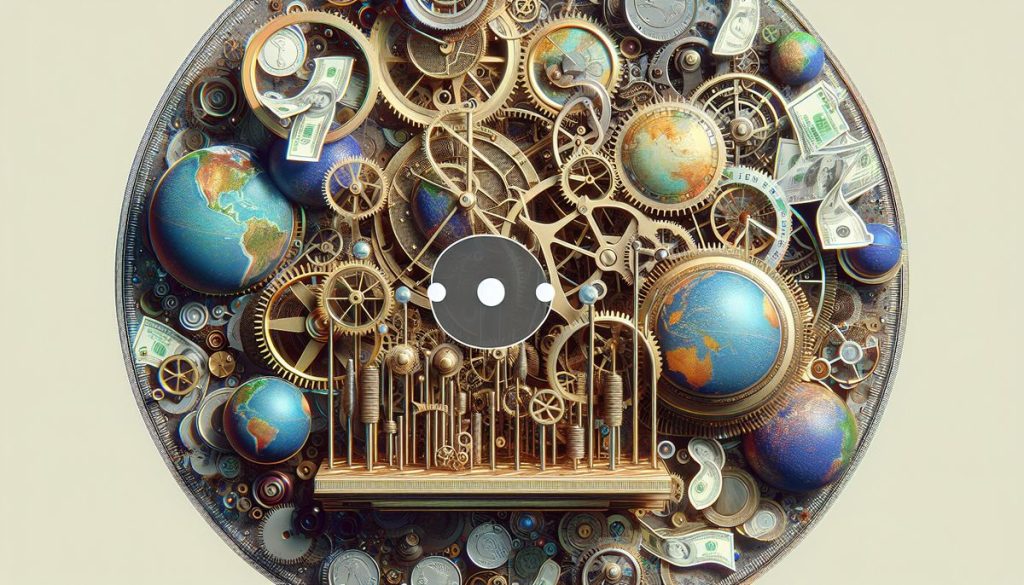Navigating the Beats of Law: A Guide to Copyright and Trademark for Aspiring Musicians
Written by DJ Prodigee on Tue Apr, 2024
For aspiring musicians, the path to stardom is not only about perfecting your craft but also about understanding the legal framework that protects your work. The music industry is laden with copyright and trademark intricacies that can make or break an artist’s career. This article delves into the essential copyright and trademark law tips for upcoming artists, offering guidance to help you navigate the legalities and ensure your artistic creations and brand remain safeguarded.
Key Takeaways
- Understand the essentials of copyright law to prevent infringement and ensure your music is legally protected.
- Recognize the importance of trademarking your band’s name and logo to maintain control over your brand identity.
- Learn the intricacies of music contracts to avoid pitfalls and secure your rights and earnings.
- Stay informed about international copyright laws and establish local partnerships to manage your music rights globally.
- Embrace the legal aspects of the music industry as part of your professional development to safeguard your career and creations.
Copywrong to Copy-Right: Keeping Your Beats in the Legal Beat
Why Registering Your Jam is a Slam Dunk
Let’s face it, your beats are like your babies, and you wouldn’t send your kids out into the world without some armor, right? Registering your music is like enrolling your tunes in a self-defense class—it teaches them how to fight off the music thieves and sample snatchers. By registering, you’re not just throwing a legal shield around your work; you’re also unlocking a treasure chest of royalties that you’re entitled to.
While copyright protection is automatically granted to the author as soon as the work is created, there are extra perks if you register. Think of it as VIP access to the copyright club.
Remember, copyright disputes are like that one song that gets stuck in your head: annoying, time-consuming, and expensive. So, keep your creations close and your copyrights closer! Here’s a quick and easy game plan:
- Register your work to hit the high notes of legal protection.
- Track your tunes to ensure they’re not being played without permission.
- Enforce your rights if someone tries to cover your song without paying up.
- Negotiate deals for your music to be used in ways that benefit you financially.
And if you think this is just for the big players, think again. Even if you’re just starting out, making sure your music is legally protected is a no-brainer. Because let’s be honest, nobody wants to get ‘Taylor Swift’d’ and watch someone else run away with their hard-earned hits.
Tracking Tunes: The Musical Stalker’s Guide
So you’ve laid down some killer tracks and you’re ready to take over the world, one earworm at a time. But hold up! Before you start dreaming of gold records and sold-out tours, you’ve got to make sure no one’s pulling a fast one with your tunes. Keeping track of your music is like being a detective in your own crime drama—except the crime is copyright infringement and the drama is… well, still pretty dramatic.
- Register your work to hit the high notes of legal protection.
- Track your tunes to ensure they’re not being played without permission.
- Enforce your rights if someone tries to cover your song without paying up.
But let’s not forget about the moolah. You didn’t spend all those hours in the studio just to give your music away for free, did you? Dive into the specifics of performance rights and mechanical licenses to make sure you’re getting every penny you’re owed. And remember, royalties are your best friend—they’re the gift that keeps on giving, long after the last note fades out.
Pro tip: Don’t just play music, play the long game. Understanding copyright and trademark laws is crucial for musicians to protect their original work and avoid legal disputes.
Cover Me Not: Enforcing Your Sonic Space
So you’ve crafted a killer track that’s all the rage in your local dive bar, and now you’re ready to take on the world. But wait! Before you let your tunes loose on the internet, remember: your music is like your baby, and you wouldn’t let just anyone babysit your kid, right? It’s time to enforce your sonic space and make sure no sneaky cover artists or ad agencies are using your jams without sending some coin your way.
Here’s the deal: copyright is your music’s legal bodyguard, and it’s not just there to look tough. It’s got your back when someone tries to pull a fast one. To keep your musical offspring safe, follow this simple checklist:
- Register your work to hit the high notes of legal protection.
- Track your tunes to ensure they’re not being played without permission.
- Enforce your rights if someone tries to cover your song without paying up.
- Negotiate deals for your music to be used in ways that benefit you financially.
Remember, it’s not just about making music; it’s about making sure you get paid for your beats. So don’t let your guard down, or you might find your hit song playing in a commercial for toe fungus cream – without your permission!
And if you’re feeling lost in the legal maze, take a cue from the ReverbNation Blog and visit the U.S. Copyright Office website. They’ve got all the forms and info you need to keep your tunes safe and sound. After all, you want your music to be famous for its sick beats, not for being the poster child of a copyright infringement lawsuit.
Trademark Tunes: Naming Your Band Without Getting Banned
Logo Lowdown: Making Your Mark Without Getting Sued
So you’ve got a logo that’s cooler than a polar bear’s toenails, and you’re ready to plaster it on everything from guitar picks to granny’s homemade jam. Hold your horses, Picasso! Before you turn the world into your personal canvas, let’s talk trademarks.
- First, do your homework. Make sure your logo isn’t already taken by some other band of merry minstrels.
- Next, get that bad boy registered. It’s like putting a force field around your brand.
- Finally, keep an eye out for copycats. If you spot a knock-off, it’s time to unleash your inner legal eagle.
And remember, a trademark is more than just a legal hoop to jump through; it’s the secret sauce that keeps your brand spicy and unique in a world of bland imitations.
Now, if you’re thinking this is all about slapping your name on t-shirts and stickers, you’re only scratching the surface. Trademarks are the unsung heroes that protect everything from your band’s name to those catchy one-liners your fans can’t stop tweeting. So treat your trademark like the rockstar it is—keep it safe, keep it sound, and keep it legally yours.
Merch Madness: Protecting Your Swag Across Borders
So you’ve decided to turn your band’s fame into a merchandising fiesta. Before you slap your logo on everything but the kitchen sink, remember: trademarks are your brand’s knights in shining armor. They’re not just for the big players; even garage bands need to shield their swag from the dark arts of counterfeiting.
Let’s face it, your band’s merch is hotter than a vinyl record left in the sun. But with fame comes those pesky bootleggers, ready to slap your logo on anything that doesn’t move. Protecting your brand is like playing whack-a-mole with counterfeiters; it’s exhausting but necessary. And if you think this is just about t-shirts and posters, think again. Trademarks cover everything from your band’s name to those catchy phrases from your lyrics that fans love to quote. So, protect your brand like you protect your guitar: with fierce love and a touch of paranoia.
So, before you pack your guitar and your glossy headshots, make sure you’re not packing legal woes alongside your merch. International law requires a symphony of legal instruments, and you’re the conductor.
Here’s a quick checklist to keep you in tune with the legal notes abroad:
- Register your trademarks in key markets
- Monitor for unauthorized use
- Work with local legal eagles
- Update contracts to include international clauses
Contract Clarity: Keeping Your Deals as Sharp as Your Hooks
Contracts are like drum solos: they can be epic, but one wrong beat and the whole show’s off. If you’re staring down a contract that’s thicker than your bassist’s beard, it’s time to get a professional to comb through it. Before signing anything: Get a lawyer to review the terms. When negotiating deals: Have legal backup to advocate for your interests. If you’re accused of infringement: Don’t go solo, get a lawyer to defend your tune.
Understand the contract: Know what you’re signing away and what you’re getting in return. Royalties: Make sure you’re making cents (and dollars) of the royalties clause. Rights: Keep an eye on what rights you retain and which ones you’re licensing out.
Remember, a contract is like a tattoo, it’s pretty permanent. So, make sure you’re cool with the terms before you make it official.
And hey, don’t forget about endorsement deals. They can mean free gear or a hefty discount, but arranging one is not a walk in the park. It’s like trying to get backstage without a pass—possible, but you gotta have the chops. Here’s a quick rundown to keep you from signing your soul away:
- Firstly, get to know your contract like it’s your setlist. Look for those escape hatch clauses that might save your gig one day.
- Secondly, keep your eyes peeled for any slip-ups by the other party. A classic showstopper? Not getting paid on time.
- Thirdly, document every handshake, every promise, every little detail. Trust me, your future self, lounging in a hammock, will be grateful.
The Worldwide Stage: Copyright Laws Without Borders
Global Groove: Understanding International Copyright Quirks
When you’re a musician dreaming of a world tour, remember that international copyright law is the mixtape no one’s dancing to the same beat. Navigating the complex world of copyright law in the music industry is like trying to order a burrito in Paris
Here’s a quick checklist to keep you in tune with the legal notes abroad:
- Understand the local copyright laws (no, not just the Wi-Fi password).
- Register your work where necessary (because ‘I didn’t know’ doesn’t play well in court).
- Keep track of your international royalties (or risk singing the blues over lost income).
But remember, a split sheet is just the tip of the iceberg. To avoid turning your hit into a legal hit, make sure you dive deeper with a comprehensive agreement.
And hey, if you’re feeling lost in the legal jargon jungle, consulting with a knowledgeable lawyer when necessary is your compass. Stay organized to monitor your music’s usage, performance, and rights. After all, you don’t want to end up getting ‘Taylor Swift’d’ in a foreign country!
Legal Eagles: Finding Your International Law Liaison
When you’re strutting your stuff on the global stage, you don’t want to hit a legal sour note that could mute your world tour. Finding a local legal eagle is like snagging the ultimate backstage pass; they’ll help you sidestep the copyright booby traps hidden in every corner of the globe. Think of them as your legal tour guide, ensuring your beats are safe, no matter where you drop the bass.
So, before you pack your guitar and your glossy headshots, make sure you’re not packing legal woes alongside your merch. International law requires a symphony of legal instruments, and you’re the conductor.
Here’s a quick checklist to keep you in tune with the legal notes abroad:
- Understand the local copyright laws (no, not just the Wi-Fi password).
- Register your work where necessary (because ‘I didn’t know’ doesn’t play well in court).
- Keep track of your international royalties (or risk singing the blues over lost income).
And hey, if you ever feel lost in the legal maze, just think of this article as your trusty GPS, guiding you to stardom without the drama of a courtroom encore. Now go out there and make some noise (legally, of course)!
Avoiding the ‘Lost in Translation’ Tour Fiasco
Ever felt like you’re playing a game of legal Twister while trying to book an international gig? You’re not alone. The world of international music tours is a minefield of visa issues, contract clauses, and local laws that could make your head spin faster than a DJ at a rave.
Firstly, get your paperwork groove on early. Visa delays are like that one fan who shows up way too late — annoying and totally avoidable with a bit of planning. Secondly, find yourself a local legal maestro. This person is your tour’s GPS through the legal labyrinth of each country. And thirdly, remember that contracts are like setlists; know them inside out, and be ready to improvise if the crowd—err, the other party—throws you a curveball.
Wrapping it up with a beat means staying out of legal hot water. Make legal checklists your pre-show ritual, and you’ll be the headliner, not the side act, in the courtroom.
Remember, folks, navigating the international stage isn’t just about keeping your tunes tight; it’s about keeping your legal game even tighter. So, before you jet off on your world tour, make sure your legal ducks are in a row — or you might find yourself doing the ‘bureaucracy boogie’ instead of the encore.
Your Music’s Legal Bodyguard: Understanding Copyright
Performance Rights and Mechanical Licenses: The Nitty-Gritty
Ever felt like the music biz is just a fancy game of Monopoly, but instead of buying properties, you’re snagging licenses? Well, strap in, because we’re about to decode the mystical realm of mechanical licenses and why they’re the unsung heroes of your bank account. Mechanical licenses are your golden ticket to legally reproducing and distributing someone else’s jam, or even your own, without ending up in copyright jail.
So, you’ve got a killer cover of ‘Bohemian Rhapsody’ ready to rock the world? Hold your horses, Freddie Mercury wannabe. Before you unleash your masterpiece, you’ll need to cough up some dough for a mechanical license. This bad boy lets you pay a ‘statutory royalty rate’ to the original songwriters—think of it as a tip for their genius.
But wait, there’s more! Mechanical royalties are the sweet, sweet fruit of your labor. Every time someone buys your cover or streams it on their avocado-toast-making playlist, you get a slice of the pie.
Now, who’s in charge of collecting these royalties? Enter the Harry Fox Agency and Music Reports, the music industry’s equivalent of the IRS. They make sure you get your fair share, so you can keep strumming that guitar without financial frets.
Piracy Pitfalls: Keeping Your Masterpieces to Yourself
Ahoy there, musical buccaneers! Before you set sail in the treacherous waters of the music biz, you’ll want to make sure your precious tunes aren’t plundered by pesky pirates. Registering your work is like burying your treasure with a map only you can read. It’s the first step to claiming your spot in the copyright club – and trust me, it’s way cooler than any secret society you weren’t invited to in high school.
While copyright protection is automatically granted, registering gives you that VIP backstage pass to legal perks.
But what’s a captain without a crew? Tracking your tunes is like having a loyal parrot on your shoulder, always keeping an eye (or ear) out for any scallywags misusing your jams. And if someone dares to cover your song without tossing a few doubloons your way, it’s time to enforce your rights with the ferocity of a sea storm.
- Master Use License: Permission to use the original recording.
- Sync License: Permission to use the composition.
Remember, folks, creativity is about making your own waves, not just riding on someone else’s. So, before you sample that sick beat or belt out a cover, make sure you’re not stepping on any legal toes.
Negotiation Know-How: Making Money Moves with Your Music
So you’ve got your tunes tighter than a snare drum on a cold day, and now it’s time to make those beats pay the bills. Negotiating deals for your music isn’t just about shaking hands and signing on the dotted line; it’s an art form, like playing the guitar with your teeth. But fear not, here’s the lowdown on how to strum the strings of a solid contract.
First up, let’s talk licensing deals. Imagine your track lighting up the scene in a movie or getting gamers hyped in a video game. That’s sync licensing, baby! But before you start seeing dollar signs, remember that the devil is in the details:
- Understand the contract: Don’t just nod and smile; know what you’re signing.
- Royalties: Make sure the deal makes sense, down to the last cent.
- Rights: Keep a tight grip on what you’re giving away.
Remember, every deal is a potential hit or miss, so aim for the charts with each clause.
And if someone comes at you with a ‘take it or leave it’ attitude, consider that your cue to exit stage left. Always have your music’s back, because if you don’t, who will?
The Beat Goes to Court: When Music Meets the Gavel
Getting ‘Taylor Swift’d’: A Cautionary Tale
Ever heard of getting ‘Taylor Swift’d’? No, it’s not the latest dance craze, but a real-life drama that unfolded in the music business. Imagine working your vocal cords to the bone, writing hit after hit, only to find out someone else owns your tunes. That’s what happened to Taylor Swift when her former label, Big Machine Records, got acquired and her back catalog went with it. Swift’s worst nightmare became a teachable moment for all aspiring musicians.
Here’s the skinny on avoiding your own ‘Swift’ saga:
- Understand your contracts inside and out.
- Establish a ‘loan-out’ company to keep business separate from personal.
- Protect your brand like it’s the last slice of pizza at a party.
- Monetize your music for long-term success, not just a quick buck.
Remember, knowledge is power, and in the music biz, it’s your ticket to staying in control of your art. Don’t let your hard work become someone else’s payday.
Esports and Music: Syncing Your Tunes with Gaming Giants
So you’ve got beats that make gamers want to move—even if it’s just their thumbs on a controller. Esports and music are like peanut butter and jelly, a combo that’s too tasty to ignore. With major brands from Gillette to Red Bull diving into the gaming arena, the esports ‘boom’ is music to the ears of savvy musicians. But before you jump on the bandwagon, remember to protect your brand with trademarks and music with copyrights.
Here’s the lowdown on syncing your tunes with gaming giants:
- Secure your name internationally to avoid any high-score level legal battles.
- Monetize your music legally by navigating the maze of licensing deals.
- Stay tuned for more legal tips for musicians to keep your wallet as fat as your beats.
Remember, in the world of esports, your music isn’t just background noise—it’s part of the main event. Make sure it’s playing on your terms.
Fashion, Beauty, and Beats: Protecting Your Sound in Style
When your beats are as stylish as your band’s look, you’ve got to protect that aesthetic like it’s the last pair of skinny jeans on Earth. Trademarking isn’t just for logos and taglines; it’s your fashion-forward shield against the copycats.
Here’s how to keep your sound and style in the clear:
- Register your trademarks to ensure your band’s name and logo are exclusively yours.
- Monitor the market for knock-offs and take action if you spot a faux fan fashion line.
- Negotiate licensing deals that let you cash in on your chic sound without selling out.
Remember, in the world of music, your brand’s image is as crucial as the chords you strum. So, keep your legal game as sharp as your eyeliner, and you’ll be hitting the high notes on and off the stage.
Conclusion: Keepin’ It Legal and Lively!
And that’s a wrap, my fellow rhythm rebels and melody maestros! If you’ve made it this far without dozing off or considering a career change, congrats! You’re officially on your way to becoming a legal eagle of the music world. Remember, copyright and trademark laws are like the strict parents of your musical baby—they might be a pain, but they’re just trying to keep your tunes safe from those no-good, riff-stealing rascals. So, register your work, trademark your band’s name, and don’t sign anything without reading the fine print (or getting someone who can). Keep your music out of the piracy pit and your band out of the courtroom conga line. Rock on legally, and may your tracks be hits and your legal battles few!
Frequently Asked Questions
Why is it important for me to register my music?
Registering your music ensures you have legal protection and can prove ownership, which is crucial for enforcing your rights against unauthorized use or infringement.
How can I protect my band’s name and logo through trademarking?
To protect your band’s name and logo, you should register them as trademarks, which grants you exclusive rights to use the marks and prevent others from using similar ones that could cause confusion.
What are performance rights and mechanical licenses?
Performance rights allow you to earn royalties when your music is performed publicly. Mechanical licenses are agreements that permit others to reproduce and distribute your compositions for a fee.
What should I consider when entering music contracts?
Ensure clarity on rights assignment, royalty distribution, duration, and obligations of each party. It’s often wise to consult with a music law professional before signing.
How do international copyright laws affect my music?
International copyright laws vary by country, affecting how your music is protected and monetized abroad. It’s important to understand these differences, especially if you plan to distribute your music globally.
What steps should I take if my music is used without my permission?
First, verify the infringement, then attempt to resolve it amicably. If necessary, issue a cease and desist letter or seek legal action to enforce your rights and seek compensation.







